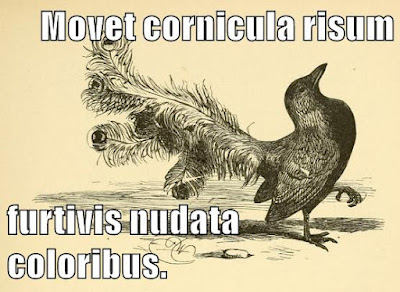Absente fele, musculi ducunt choros.
Compare the English saying, "when the cat's away, the mice will play." And yes, the English word "muscle" really does mean "little mouse," from the idea that it looks like a mouse running under your skin; eeek!
Ruinis imminentibus, musculi praemigrant.
Compare the English saying, "rats deserting a sinking ship."
Movet cornicula risum furtivis nudata coloribus.
This saying refers to an Aesop's fable: the story of the bird who took the other birds' colored feathers for herself; cornicula here is a diminutive of cornix.
Pusillae aviculae pusillos nidulos construunt.
Here you see avicula, the diminutive of avis. The word for nest is also a diminutive: nidulus, from nidus. The adjective pusillus is also a diminutive from pusus, a word you do not ever see in Latin (pusillus has completely replaced it), but the words puer and puella come from this root.
Macilenti pediculi acrius mordent.
The word "pediculus" is a diminutive of "pedis," which means "louse." This word can be very sneaky because the plural, "pedes," also looks like the plural of "pes," meaning foot. The diminutive "pediculus" can mean "little louse" or "little foot," depending on context.
In alio pediculum vides, in te ricinum non vides.
The word "ricinus" means tick (which is bigger than a tiny louse); this saying is a play on the Biblical proverb in Matthew 7: quid autem vides festucam in oculo fratris tui et trabem in oculo tuo non vides?
Melius est pisciculos cepisse, quam desidia omnino torpere.
This saying features "pisciculus," a diminutive of "piscis." No matter how small the fish you catch, it's better than doing nothing!
Here you see "vulpecula," the diminutive of "vulpes." The force of the proverb here is all on "denuo," which in a single word tells you the fox managed to get out the trap the first time she was caught, and she is not going to make the same mistake again.
Ex auricula asinum.
The word "auricula" is the diminutive of "auris." There is an implied verb here, something like "cognoscis," with "asinum" as the object of the verb. Compare a similar abbreviated saying about a lion: "ex ungue leonem." In the Aesop's fable about the donkey in the lion's skin, sometimes the donkey is recognized by his ears, sometimes by his braying. The use of "auricula" is sarcastic, of course; the donkey's ears are anything but diminutive!
Midas auriculas asini.
Auriculas asini Mida rex habet.
As you can see, the nominative can be Midas or Mida in Latin, and both of these sayings refer to the famous legend of King Midas and his barber.
Noli turbare circulos meos!
This famous phrase is attributed to Archimedes, and it even has its own Wikipedia article. The word "circulus" (as in English "circle") is a diminutive of "circus" (as in the English word "circus").
Mors sola fatetur quantula sint hominum corpuscula.
This wonderful "memento mori" saying has a diminutive both of the adjective, "quantula," and of the noun "corpuscula" (which gives us English "corpuscle").
Teneto te intra pelliculam.
Infra tuam pelliculam te contine.
These sayings both express the idea of not overextending yourself; "pellicula" is a diminutive of "pellis."
Est foculus proprius multo pretiosior auro.
The word "foculus" is a diminutive of "focus," the idea being that your hearth at home, no matter how small, is precious.
Mille viatorum fonticulus explet sitim.
Here the proverb plays on a paradox: a tiny "fonticulus" (diminutive of "fons") can nevertheless sustain many travelers over time.
Ex arena funiculum nectis.
The word "funiculus" is a diminutive of "funis," and it is the origin of the English word "funicular."
Rumpetur tensus funiculus.
Nimium tendendo rumpitur funiculus.
Nimium tendendo rumpitur funiculus.
Note the future tense form: rumpetur. Both of these proverbs express the same idea about a rope needing to relax every once in a while, just like a person needs to relax! So, if you made it all the way through this list: take a break and relax. :-)
Click here for more Latin proverb posts.


No comments:
Post a Comment
Comments are limited to Google accounts. You can also email me at laurakgibbs@gmail.com or find me at Twitter, @OnlineCrsLady.